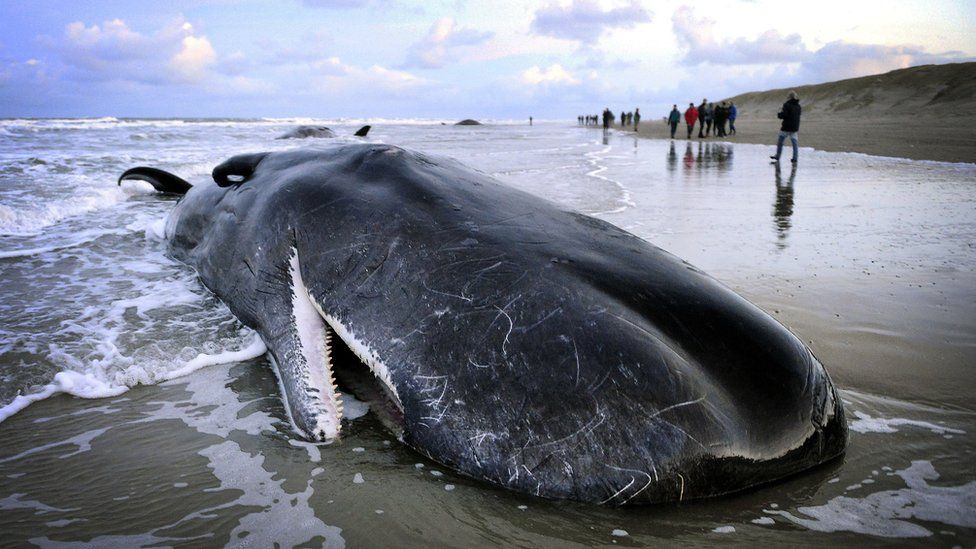Why do sperm whales wash up on beaches?
- Published

Five sperm whales have washed up in England. They are thought to belong to the same all-male pod as 12 others that were found dead around the Netherlands and Germany last week. But what caused this mass death, asks Claire Bates.
Sperm whales are deep-sea mammals that tend to live and hunt at a depth of around 3,000m. While females and their young stick to the tropics, males range further afield and are regularly spotted around Iceland, Norway and Shetland.
However, they quickly run into trouble if they enter the North Sea. This is because it lies on the European continental shelf, where the seafloor is only 200m down at its deepest point.
Sperm whales rely on sonar to navigate. They send out sound pulses, which bounce back off distant surfaces, helping them to form a clear picture of their underwater world. This doesn't work on a shallow sandy seabed, like Britain's, and whales quickly become disorientated.
"The pod probably followed a shoal of squid into the North Sea around the New Year and then got stuck," says Peter Evans, director of The SeaWatch Foundation.
"As they head south the water becomes shallower. Once they end up on a sand bank it's all over for the whale. It causes cardiovascular collapse and their organs start failing."
Andrew Brownlow, from the Scottish Marine Animal Stranding Scheme, went across to perform an autopsy on one of the whales stranded off the Netherlands.
"The whales were in good condition and so hadn't died from dehydration, which can happen as they get all their water from their food," he says. "We were also able to rule out a boat strike or entanglement, which is a common cause of strandings."
"But we weren't able to look at the brains so we can't rule out various illnesses, or a sudden noise that scared them."
Although mass whale strandings have been reported in Britain as far back as 1762, numbers are on the rise. Cases have increased from an average of one whale stranding per year from the 1940s to the 1980s, to six per year from the 1980s to today.
However, Brownlow doesn't think that the increase in numbers is necessarily because of man-made factors.
"There are valid concerns that we are making the oceans noisier, which makes it harder for whales to navigate," he says. "However, it's likely the increase is because there are more whales, because of the embargo on whaling over the past 30 years."
A change in sea currents may mean water is warmer further north, encouraging younger males to stay and feed in trenches off Norway and Shetland all year round. Also, younger male whales could be leaving their pods in greater numbers as there is more competition to get access to the females.
Evans says once the whales entered the North Sea, they had a high chance of being stranded, and it's almost impossible to successfully refloat them.
"It's a natural phenomenon that sadly can't be changed," he says.